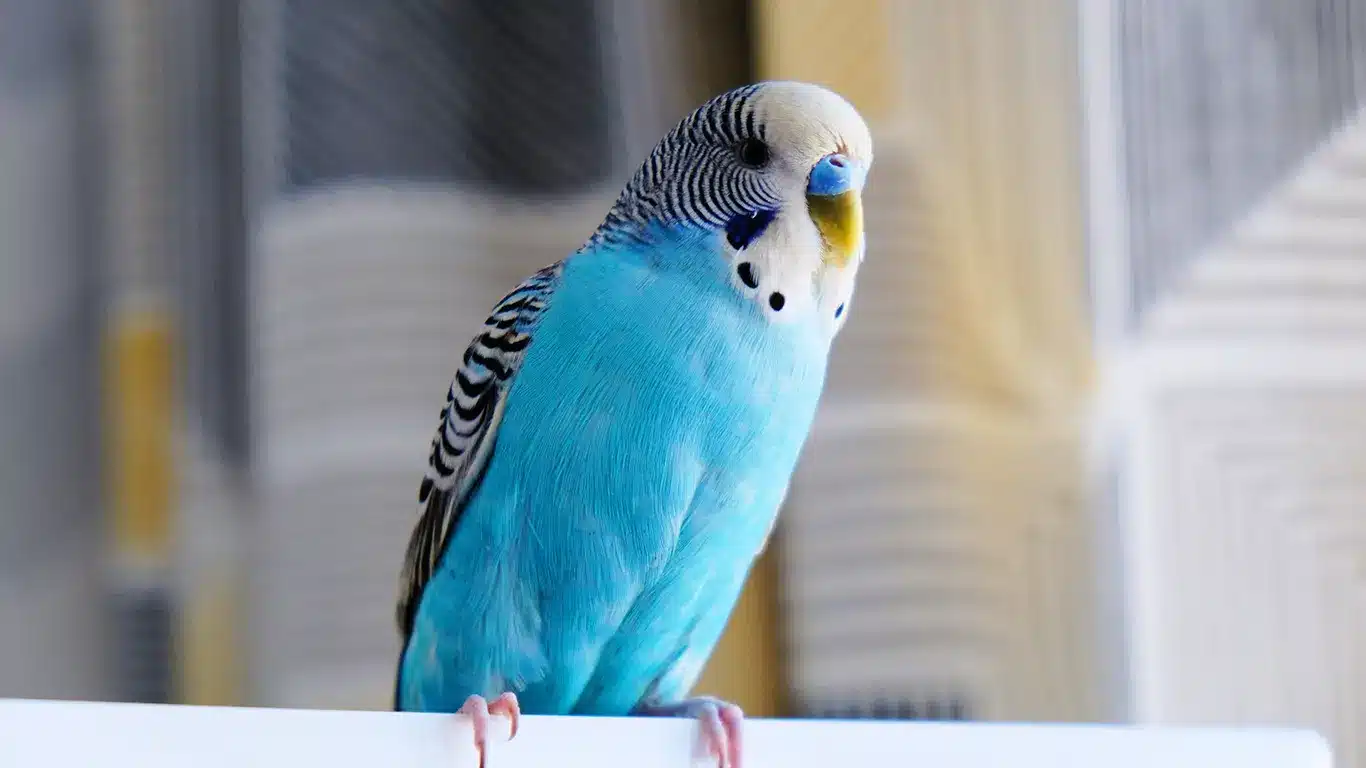There’s a new chirpy addition to your family, and you’re eager to provide the best care possible. Now, the big question on your mind is, how do I take care of my budgie in a proper way?
To keep a budgie happy and healthy, provide a varied diet, keep their habitat clean, offer an array of toys for mental stimulation, schedule routine vet visits, and give them opportunities to stretch their wings and socialize outside the cage.
This is just the beginning! This comprehensive budgie care article has more details to help you. So, keep reading. I guarantee it won’t be boring.
Why Is Budgie Care Important?
Owning any pet, whether it’s a dog, a cat, or budgies, isn’t just about the fun moments and the cute Instagram photos. It’s a real commitment.
You’re responsible for a living, breathing being, ensuring they live a healthy life. And if you think they don’t notice, trust me, THEY DO.
According to the American Veterinary Medical Association (AVMA), a well-cared budgie can live up to 18 years. That’s almost as long as some breeds of dogs.
Conversely, budgies that live in poor conditions, without proper care and an unbalanced diet, have a significantly reduced lifespan. So we need to give them proper care and attention so that they can live a long life.
What Type Of Housing Is Best For Budgies?
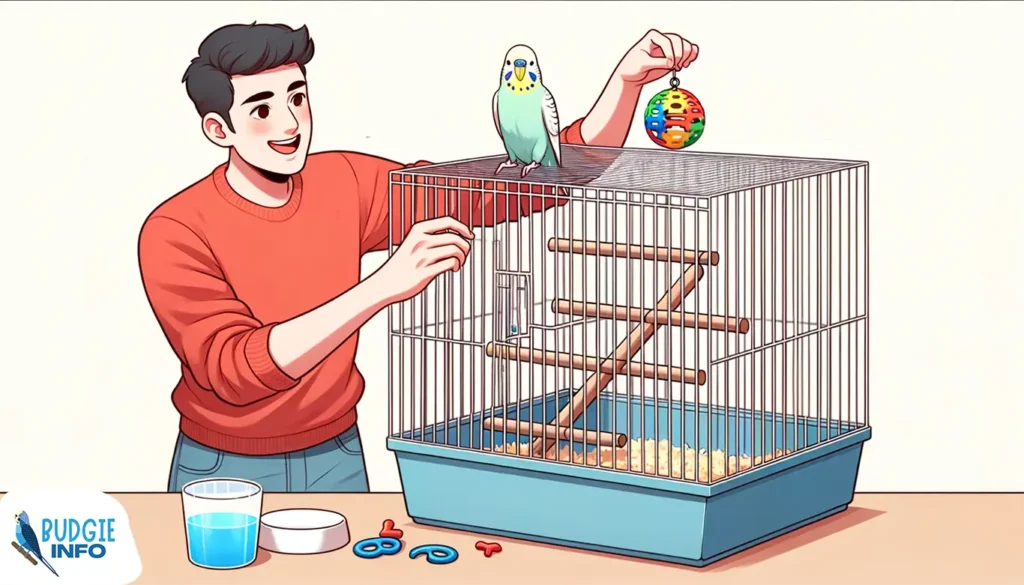
I remember setting up my budgie’s cage for the first time. And yep, I made a bunch of beginner mistakes! I had underestimated the space he’d need. Always go a bit bigger than you initially think. These birds love to stretch their wings and fly, even if it’s just a short distance. Plus, more space means more room for toys and activities to keep them engaged.
If you’re wondering about the ideal cage size for budgies, then I have some information to share…
- For one budgie, the ideal cage size is 18x18x18 inches
- If you have two budgies, their cage should be 30x18x18 inches in size
- For more than two budgies, make sure the cage size is 32x18x20 inches
The cage sizes I mentioned above are recommended by PetMD.
Here’s a tip for you, straight from my learning curve: place the cage in a lively part of your house where your budgie can enjoy some family time. They’re social creatures and love to be a part of the action.
Now, when it comes to cage materials, there’s a sea of choices. To make things easier for you, here’s a simple table breaking it down:
| Cage Material | Advantages | Disadvantages |
| Stainless Steel | Durable, easy to clean, rust-resistant | Can be pricey |
| Powder-coated | Less expensive and comes in various colors | Can chip over time, birds may chew the paint |
| Wrought Iron | Sturdy and long-lasting | Requires regular maintenance to prevent rust |
| Plastic | Lightweight and affordable | Not as durable, budgies might chew on it |
While all materials have their merits, I found stainless steel to be a winner, especially in the long run.
It’s an investment that pays off in durability and ease of maintenance. But, as always, pick what works best for your space, budget, and, most importantly, your budgie’s needs.
What Should Be Considered For A Budgie’s Diet And Nutrition?
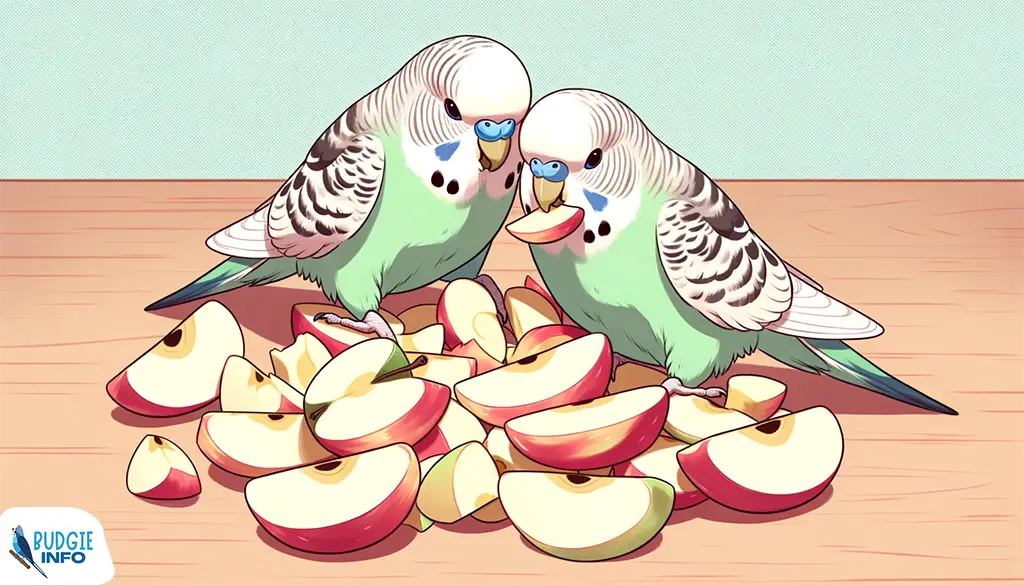
Imagine eating the same thing day in, and day out; it sounds boring, right? It’s no different for our little friend. A varied diet is very important for their overall health and well-being.
In the wild, budgies forage for various seeds, grasses, fruits, and insects depending on the season. So, you need to mimic this variety by giving a combination of:
High-Quality Pellets
As reported by Veterinary Medical Associates, high-quality pellets are healthier for birds, especially as they age. It has all the vitamins and essential nutrients that birds need to stay healthy.
If I talk about seeds, they are a popular budgie food, but they lack essential vitamins and minerals and are high in fat. Feeding only seeds can lead to health problems and even shorten their lifespan, based on VCA Animal Hospitals studies.
So I recommend choosing pellets that are endorsed by avian veterinarians. Remember, when you buy them, make sure they are free of preservatives, added sugars, artificial colors, and artificial flavors.
Seeds
As I mentioned above, seeds are a popular food for budgies. Many pet birds may enjoy seeds, but unfortunately, they lack essential nutrients and are also high in fat which is similar to junk food for humans.
Studies have shown that only seed diets can contribute to obesity and health problems in pet birds like budgies. However, you can give your budgies small quantities of seeds without worry. But, relying only on seeds is not healthy for them.
Fresh Fruits and Vegetables
Fresh fruits and vegetables are important treats for your feathered friends.
They are good sources of vitamins, minerals, and antioxidants which are crucial for their overall health. However, Avian Veterinarians recommend giving 25-30% of their diet as chopped fruits and veggies in moderation only.
Here I listed some safe fruits and vegetables for budgies:
- Apples (make sure to remove the seeds)
- Berries (like strawberries, blueberries, and raspberries)
- Pears
- Grapes
- Kiwi
- Melons (like cantaloupe and watermelon)
- Oranges
- Peaches
- Broccoli
- Spinach
- Parsley
- Cut-up carrot
- Cucumbers
- Sweet bell peppers
- Peas
- Corn
While many fruits and veggies are great for budgies, some can be also harmful including Avocados, Chocolate, Dairy products, Caffeine, Apple seeds, and Iceberg lettuce.
Fresh Water
Your budgie needs fresh and clean water to stay healthy. So if your tap water tastes weird or smells like chlorine, it’s better to give them filtered or bottled water. And lastly, wash and fill up their water dish every day to keep it clean and fresh.
Here are some additional helpful tips for you:
- Budgies might not always like new foods, so take your time and introduce them slowly.
- Give them fresh food and water every day.
- Remove uneaten fruits and vegetables after a few hours to prevent spoilage.
- Keep their food in airtight containers in a cool, dry spot to keep it fresh and full of nutrients.
How Do You Keep Budgies Healthy?
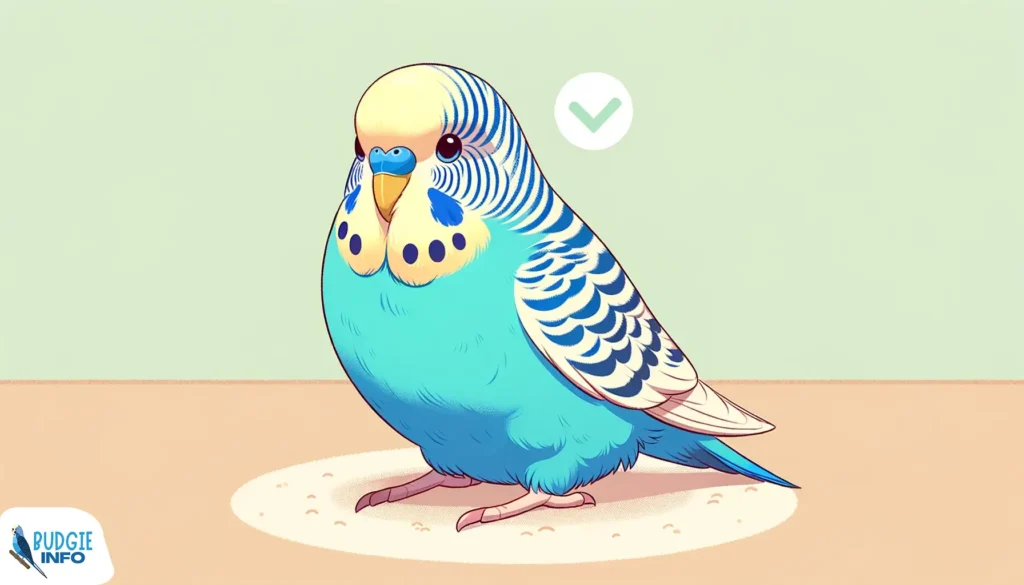
We want our feathery friends to stay around for a long time. That involves doing what is best for them to live a good and healthy life.
As a budgie owner, I have learned that these are some of the most important things you must pay attention to.
Ensure Your Budgie Sleeps Well
Between dusk and dawn, budgies need a solid 8 to 12 hours of sleep at night for a healthy life. Since budgies stay active during the day, a good sleeping schedule helps them gain energy and boosts their immune system.
You must also know that budgies prefer to sleep in dark and calm environments. If you cannot provide them with a separate dark room, try placing a thick cover over the cage or use a room divider if possible. And if you have the TV turned on, keep the volume low.
All you need to do is let them sleep properly so that they can be energetic and active as well.
Common Diseases In Budgies to Look For
Here are some of the common diseases you should watch out for:
- Gastrointestinal Problems: Weight loss, vomiting, lethargy, and diarrhea are common signs of gastrointestinal problems in budgies, which usually occur due to a weak immune system.
- Scaly Face Mites: Mites are common in budgies but require medical attention immediately.
- Respiratory Issue: If the budgie is sneezing, coughing, or wheezing, watery eyes, then it is a sign of upper respiratory health issues.
- Lumps: If you notice any lumps in the budgie, it is best to bring it to a vet as soon as possible because it could be a sign of a tumor.
- Obesity: Overfeeding, high-fat diet, and lack of exercise the budgies often cause obesity, which interferes with the bird’s movement and gradually causes other severe health issues.
- Kidney Disease: A high-protein diet can lead to kidney disease, which can have symptoms such as lethargy, vomiting, and watery droppings.
- Chlamydia Psittaci: Budgies suffering from Chlamydia Psittaci get diarrhea, difficulty breathing, discharge from their noses and eyes, sneezing, green urine, etc.
Importance of Veterinary Care
Taking the bird for a yearly checkup with a certified vet is important. Consulting a vet from time to time helps address underlying issues earlier, and you can treat your budgie on time. Also, it is essential to consult a vet if you notice an abnormality in the budgie’s behavior.
How Important Is Companionship For Budgies?
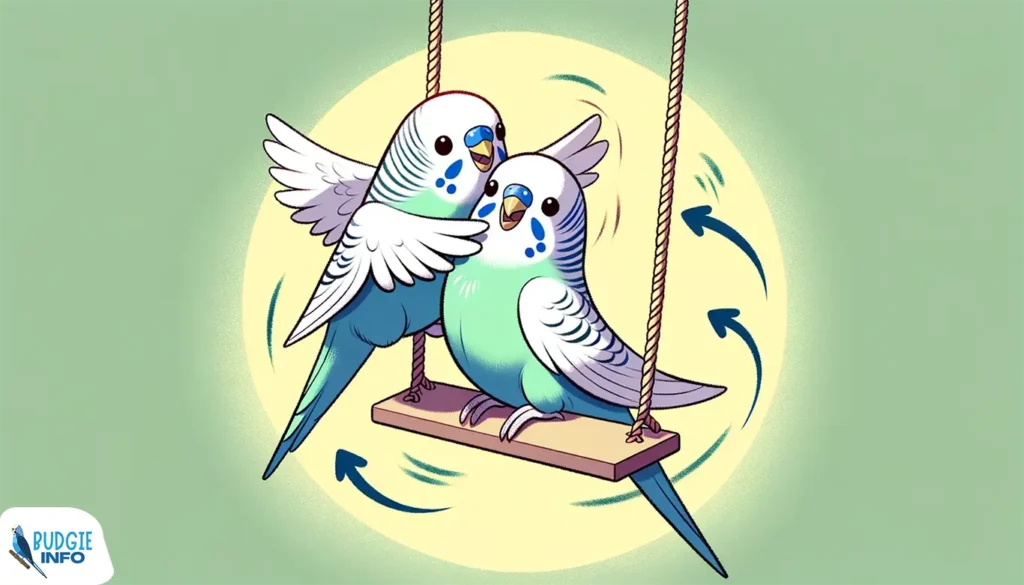
Since budgies are social birds, they thrive when you keep them in pairs or small flocks. According to PetHelpful, keeping budgies in pairs or with others is good for their emotional well-being.
Benefits of Keeping Budgies In Pairs
Keeping budgies in male-female pairs makes them more active. This way, they can easily bond, mate, and raise the chicks together. They also groom each other without showing any aggressive behavior, something you don’t get to see by keeping all male or all female (who tend to be more aggressive) budgies.
When I brought a new budgie, my other budgies became edgy and stressed. So, I introduced them gradually by keeping the single budgie in a separate cage in a separate room. Then, I kept the cages in the same room before keeping them all in the same cage.
Over time, they accepted each other and bonded well. Once they got along and chirped with their hearts’ content, my heart filled with joy, and naturally, my house became livelier.
So don’t worry if they don’t get along at first. Give them time while keeping them under supervision until the miracle happens.
You Shouldn’t Keep A Budgie Single, Here’s Why?
As I said above, budgies thrive when you keep them in pairs or small flocks. But what happens if you keep a single budgie at home?
Well, here are some of the problems you are likely to face if you keep a single budgie.
- The budgie will be less active and show little interest in toys
- The single budgie will be bored easily due to the lack of mental stimulation
- The bird can get stressed and feel edgy or aggressive all the time
- A lonely budgie can refuse to eat or stop eating altogether
- Keeping a single budgie means interacting more to keep them stimulated, which requires more time and effort
So it’s best to keep budgies in pairs—at least one male and one female budgie.
What Safety Steps Should You Take For Budgies?
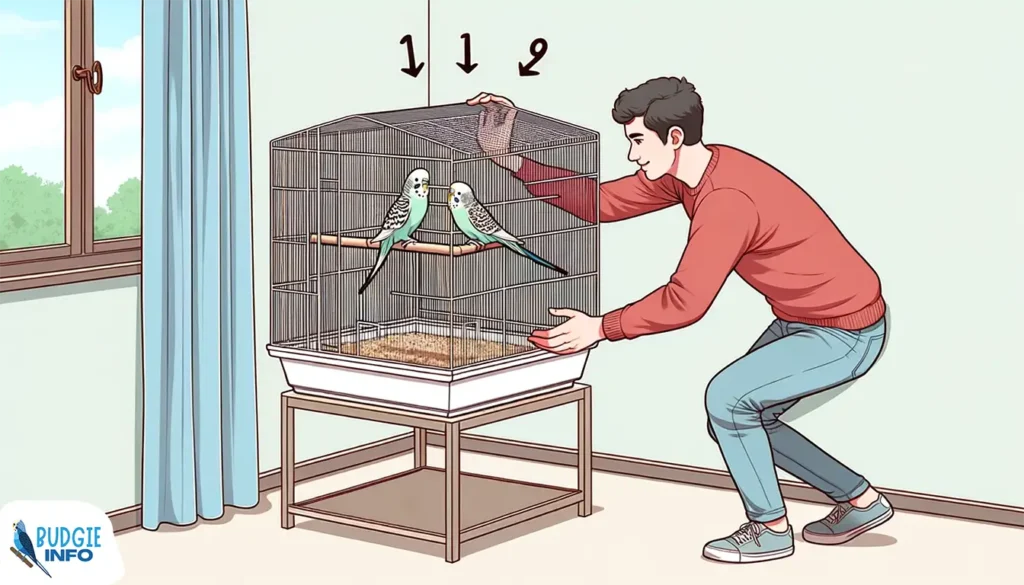
Even if you are keeping the budgie in a cage or your room, it might still not be safe enough if you are not careful. So here are some safety measures you should take for the budgie.
Keep Doors, Widows, And Fans Shut Off
If you let the budgie out of the cage, make sure to turn the fan off. Also, you must keep the doors and windows of the room shut so that the budgie won’t fly out.
Keep Budgies Away From Other Pets
If you have other pets at home, such as cats or dogs, it is safe to keep the budgie out of their reach as well.
I got to know from VetStreet, even if your other pets show harmless interest in the bird, you should keep them under supervision because their predatory behavior can cause serious injury.
Keep Budgies Away From Mirror And Non-Stick Cookware
Even if it seems harmless, budgies can fly into a mirror, mistaking it for a place. So, it is best to keep the mirror covered. Moreover, budgies should be kept away from kitchens and non-stick cookware, as they are unsafe, and the toxic fumes from kitchen utensils are harmful to budgies.
Consider The Cage Placement
It is important to know where the budgie cage should be placed.
You should always keep the budgie cage according to the budgie’s nature. If the bird is social, you can keep it in the middle of the room during the day. However, if the budgie is nervous, keeping it in a quiet room but away from the window is best. But it should still have enough social interaction.
You can also keep the cage against a wall or provide the budgie with a hiding place. This will make the bird feel safer.
How Much Out Of Cage Time Do Budgies Need?
There are many advantages to giving your budgies some out-of-cage time. Flying is an excellent physical exercise for them because it ensures their muscles stay in tip-top shape. Moreover, allowing your budgie the chance to explore outside its cage provides mental stimulation and fosters a sense of independence.
However, the out-of-cage time should last a few hours each day, according to Bird & Exotics Veterinary Clinic recommendations. In my case, I give them over an hour of freedom outside the cage every day.
Before letting your budgie spread its wings, you have to ensure the area is safe and free from anything harmful. Moreover, you need to securely close the doors and windows, and most importantly, turn off the fan.
What Forms Of Entertainment Are Suitable For Budgies?
Since budgies are social creatures. So, the best way to keep them entertained is to provide everything that encourages stimulation and keeps them active. And trust me, it doesn’t take a lot of things to entertain them.
Bird Toys For Behavioral Encouragement
To keep your budgie active, you can provide them with chewable or foraging toys. You can add perches, ladders, rope, wooden disks, beaded swings, chimes, balls, etc. These toys also help the budgies learn to preen and keep their beaks trimmed.
However, you should also pay attention when adding toys because they should not overcrowd the cage. Moreover, the toys should be made of natural materials, such as wood, paper, plants, etc., because they are safe.
Rotation of Toys To Avoid Boredom
Just like many human kids, budgies can also get bored if they play with the same toys all the time. That’s why I suggest rotating the toys once a week or at least every two weeks. Try giving them toys of different colors, textures, and functions to keep the bird interested.
Music and Melodies
Ever notice your budgie humming along to a tune? Budgies love music, and having some soft melodies play in the background can be soothing for them. But do keep the volume down; their ears are more sensitive than ours.
Human Interaction
No matter how many interesting toys you give them, budgies will still rely on human interaction. Besides, interacting with them is also the most effective way to create a good bond. So, what can you do?
Walk to your budgie’s cage whenever you can and talk to them in a calm voice. You can also play games, give them treats, and tame them gradually to climb on your finger or sit on your shoulder. You should spend around 15-20 minutes with your budgies two to three times daily.
When I first got the budgies home, they were very shy! However, I gradually interacted with them and they observed me when I served food. Lastly, I developed a good bond with them, after being much patient. More interestingly, now they feel comfortable eating from my hands.
So I must say that human interaction is very important for them to remain healthy both mentally and physically.
How To Take Care Of Budgies In Summer?
While summer might mean beach days and ice creams for you, but for budgies, it’s a season to stay cool and hydrated. During the summer months, direct sunlight can overheat their small bodies which is dangerous for them.
So place their cage in a bright area but out of direct sunlight. Just think of it as giving them a cool shade under a tree on a hot day.
The next thing you need to make sure your budgie stays hydrated by providing fresh water. And change their drinking water more often to keep it cool.
In the hot months, budgies benefit from more baths to stay cool. You can give them a shallow dish of water to bathe in a few times a week using a small bowl or a special bird bath. Some budgies like mist baths where you spray them with lukewarm water from a spray bottle. Just make sure the water isn’t too hot or cold!
Lastly, you can give them some water-rich foods like watermelon, strawberries, cucumber, and herbs such as mint leaves.
How To Take Care Of Budgies In Winter?
Unlike humans, budgies are not fans of snow. In fact, budgies are delicate, and the chilly weather can push them to their deathbeds. Follow the below tips to save these birds from such misery.
1. Positioning The Cage
This step is only applicable if you have a portable budgie cage.
Budgies love the natural view. That is why I often keep them on our balcony.
In winter, it is unwise to keep the budgies in an open space. Instead, move them to a room with zero air drift. But let me warn you. The birds can get bored without a glimpse of nature.
So, I always set the cage just beside the closed windows. The budgies receive their fair share of sunlight and heat during the morning and noon. Besides, they can see through the window.
However, I move the cage away from the windows during the night.
2. Manage A Reliable And Safe Heating Source
Budgies are more lively at a 70F to 75F temperature. But on cold days, the temperature falls way below this range.
I know budgies can trap heat utilizing the air pockets under the feathers. However, those are barely sufficient.
You can definitely turn on the room heater to circulate hot air. Yet, I think you should reconsider the heating arrangements.
My advice would be to install a heating lamp right above the cage. These bulbs are specially designed for avians.
Now, if you think you can avoid the heating lamps by moving the cage to the window, you are wrong. There will be days when you can not even spot the sun!
Hence, setting up the heating bulb is the wisest decision for budgie owners.
3. How To Keep Budgies Warm At Night
Sadly, the temperature drops below 60F on cold nights. If you leave the budgies without heat in this chilly weather, they will freeze to death!
The room heater offers additional support in this scenario. The bright heating lamps might interrupt the sleeping cycle of the budgies. So, just cover the cage with a blanket and keep the light turned on the entire night. This will help the birds stay warm.
You can also invest in night heating lamps. These lights radiate sufficient heat with almost zero brightness. Therefore, no interruption in the good night’s sleep.
4. Humidifier Is An Essential
Budgies seem to face dry skin and skin shedding during winter. The skin irritation will become severe if you do not arrange a moisture source. Such skin diseases often go unnoticed as the birds are covered with feathers.
The easiest solution to this issue is to install a humidifier in the room. Well, a quality humidifier is quite expensive, and the price goes up depending on the room size.
If you are short on money, you have to bathe the budgies more frequently. But drying them in winter becomes a bigger problem. If you leave the birds wet, they will catch cold.
5. Exercises Keep The Birds Warm
You can not allow your budgies to stay inactive. This will make them feel more cold. To boost their enthusiasm, you should attach fun toys to the cage. The pets will stay busy solving the puzzles, and it will also warm them up for the time being.
Also, once in a while, open the cage window and let the birds fly free in the room. This is a good exercise for them. But make sure to turn off the room heater during this time.
6. Food For Budgie In Winter
Budgies can fall victim to malnutrition during the winter. So, I never compromise with a balanced diet. I add millet, seeds, pellets, and fruity treats for them regularly. The nutritious meals boost their immunity and keep them away from sickness.
Final Words
So there you have it! Now you know how to take good care of your new feathery friend from this comprehensive budgie care guide. Remember, your budgie will appreciate your care, and you’ll enjoy their company and cheerful sounds for a long time.
FAQs About How to Take Care of a Budgie
Is It Easy To Take Care Of A Budgie?
Yes! Budgies require basic care like feeding, cage cleaning, and some playtime. However, like all pets, they need attention, love, and regular check-ups.
Can Budgies Be Left Alone All Day?
Occasionally, yes. But they’re social birds and thrive with interaction. If left alone often, consider toys, music, or even a budgie mate to keep them company. Extended solitude can lead to boredom and stress.
Do You Have To Cover A Budgie At Night?
Not mandatory, but it can help. Covering provides darkness and reduces disturbances, promoting a good night’s sleep. Just make sure the room isn’t too cold and the cover is breathable!
Should I Shower My Budgie?
Not a traditional shower, but yes to misting! Use a spray bottle with lukewarm water to gently mist them. Some budgies also enjoy shallow baths. Always let them dry naturally in a warm room.
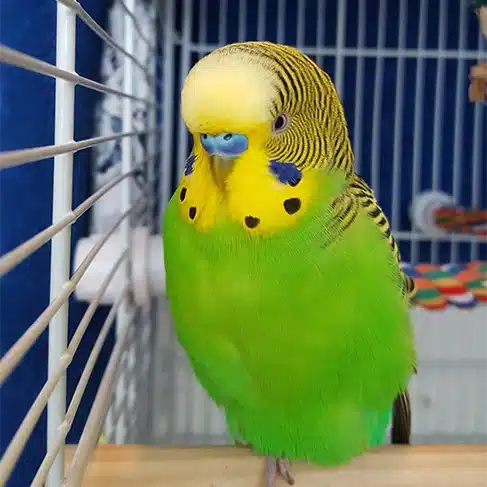
I’m Shajid Rahman, a happy owner of 6 beautiful budgies. I take care of this website to share tips, fun facts, and care guides about these birds.
Whether you’re a budgie lover or considering one as a pet, you’ll find helpful info here! I love these cute creatures, so I made this blog for Budgerigar fans. You can expect to get reliable information based on my years of experience. More About Me →

